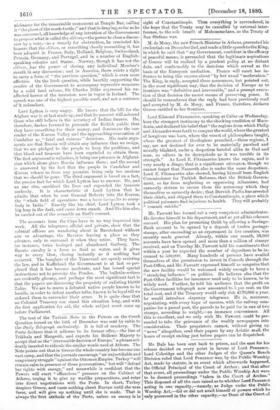Lord Lytton is very angry. He knows that the bill
for the Afghan war is at last made up, and that its amount will astound those who still believe in the accuracy of Indian finance. He, therefore, dashes forward to persuade the British public that they have something for their money, and denounces the sur- render of the Karam Valley and the approaching evacuation of Candahar as ." fatal and ruinous " decisions. His main argu- ments are that Russia will obtain any influence that we resign, that we are pledged to the people to keep the positions, and that blood and treasure have been expended to obtain them. The first argument is valueless, it being our presence in Afghani- stan which alone gives Russia influence there ; and the second is answered by the fact that the people in Candahar and Karam release us from any promise, being only too anxious that we should be gone. The third argument is based on a fact, the precise fact for which Lord Lytton has to answer. He, and no one else, sacrificed the lives and expended the treasure uselessly. It is characteristic of Lord Lytton that he admits that when he sent General Roberts into the Kurum, the "whole field of operations was a terra incognita to every- body in India." Exactly like his chief, Lord Lytton took a big leap in the dark, and came down smash. And like him also, he carried out of the scramble an Earl's coronet.






































 Previous page
Previous page